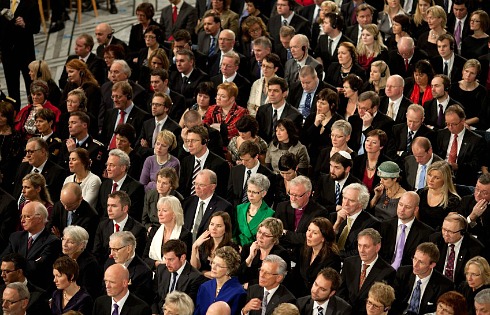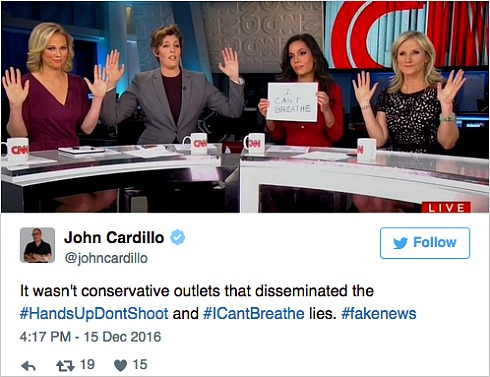Archives
AND MORE...

America's Future Voters?
_____________________

Don't Know Much About Much
_____________________

Idiots of Wahhabi U.
_____________________

Hiring: Schizophrenics & Intellectually Disabled
_____________________

You Were Born That Way!
_____________________
December 16, 2016
Groupthink Zombies
“Today’s issues with groupthink are far more dangerous now, thanks to a new media brought on by surges in social media technology,” writes Benjamin Mannes in a very interesting piece about how groupthink is hurting America (see below).
It is well worth the read.
The only thing we would add is that American societal norms also need to change, as they discourage critical thinking and disagreement/opposing viewpoints, at least in polite society.
Moreover our educational system needs a serious overhaul. It has devolved to accommodate the lowest common denominator, and reflects a so-called “Liberal” viewpoint that often has very little to do with actual knowledge (e.g., here, here, and here).
The Hill | December 16, 2016
Groupthink Is Hurting America; Black Lives Matter And Pizzagate Are Proof
By A. Benjamin Mannes, Contributor

Just one generation ago, it would be fair to say that nobody could fathom the deterioration of the state of discourse in America.
Despite the visceral partisan disagreements of the Clinton impeachment and George W. Bush invasion of Iraq, the news media tried to uphold the appearance of impartiality and the public took the internet with a grain of salt.
Unfortunately, our ability to reason has deteriorated greatly.
Americans on both sides of the aisle are now isolated among those with similar beliefs; this has created a dangerous lack of thought process involving the interpretation of counterpoint and filtering for credibility. The root of this problem can be identified as “groupthink.”
Author Andrew DuBrin defines “groupthink” as a deterioration of mental efficiency, reality testing, and moral judgment in the interest of group solidarity. Groupthink results in an extreme form of consensus, which isolates members from different views and in turn, narrows their perspective.
Problems with groupthink were originally associated in corporate settings, with issues identified on the rise in consensus building in corporate environments leading to the disappearance of the “lone genius.”
Today’s issues with groupthink are far more dangerous now, thanks to a new media brought on by surges in social media technology.
More Americans are moving to mobile devices for consumption of news and media. While I'm sure that The Hill appreciates your online readership, as do I, the surge in technology has greatly exacerbated the problem of groupthink.
In the not-too-distant past, America got its news from the purchase of a periodical, a handful of radio stations, and a couple of nightly news broadcasts.
The change started roughly 30 years ago when the 24-hour cable news cycle was born. When the first Gulf war occurred and CNN was covering scud missile attacks from a Baghdad hotel in the middle of the night, the news stopped being a public service and started being a competitive enterprise.
Over the three decades since, an evolution has occurred.
First, the editorial quality of the various cable news stations deteriorated as the stations had to rush to get a story on the air before their competitor broke it. Then, as ratings became a factor, news networks started trying to get market segments, where Fox News cornered the market on conservative news and MSNBC targeted the progressive left.
Meanwhile, blogs became mainstream and eventually court rulings gave them the same protections as established media outlets. The result is what has become common in the way Americans access news now, via websites that fit their specific political and/or ideological beliefs … regardless of the credibility therein.
For any group or movement to be effective, somebody within that group has to represent the counterpoint and identify when that group is inaccurate or making a bad decision. In an established news outlet, the editor usually plays this role.
The problem with the majority of the online media, social media and the extremely partisan nature of many Americans these days is that a specific group atmosphere values “cheering each other on” more than communicating facts. If these groups consider themselves as part of a movement, they act as a unit.
As these units don’t seek other views through traditional news sources or opposing viewpoints, they become impervious to outside criticism and have illusions of their own righteousness and truth’ As a consequence, many Americans have lost the ability of critical analysis.
Look at how groupthink in business contributed to several of the toxic financial crisis of several years ago involving major investment banks. The investment banks in question offered mortgage-backed securities to the public without informing their clients that the mortgages behind these securities were high risk.
When homeowners defaulted on their mortgages, the securities lost considerable value or became worthless. Groupthink was probably involved because highly paid, intelligent individual financial executives most likely would not have attempted frauds of this magnitude without a culture of permissiveness involved.
Then consider the Black Lives Matter movement, which has managed to become mainstream despite a myriad of evidence proving the claims that motivating its followers false. The birth of the Black Lives Matter movement as reported in the mainstream media rose from the officer-involved shooting of robbery suspect Mike Brown in Ferguson, Mo., where they coined the phrase “hands up, don’t shoot.”

Groupthink made that the mantra of numerous protests and riots that have followed multiple officer-involved shootings; yet two independent autopsies and a slew of eyewitness reports proved that Brown did not have his hands up and that initial reports from his friend and accomplice were false. As the “group” doesn’t trust or consider these facts as true, they continue to push a false narrative that has resulted in costly, violent riots.
Groupthink is leading to ridiculous circumstances in the almost daily protests following the 2016 presidential election of Donald J. Trump. Over a year of immersing America in the most toxic election resulted in a large swath of college-age Americans who actually believed, despite the most basic knowledge in government and law, that they could somehow reverse the results of a national election by protesting.
Worse off, these permit-less protests were often ignored by local law enforcement, which created dangerous traffic jams where medical response and the ability to commute by taxpayers was hindered.
The absolute proof that America’s collective groupthink problem poses a danger has unfortunately emerged from the right side of the aisle. On Dec. 4, 2016, Edgar Maddison Welch of Salisbury, N.C., committed a shooting inside a D.C. pizzeria claiming he was investigating the internet conspiracy theory known as “pizzagate.”
The 28-year-old has been in custody since the shooting at Comet Ping Pong, a popular D.C. restaurant that was reported falsely on conservative websites as the site of a child sex trafficking ring run by prominent Democrats, including Clinton confidant John Podesta.

© Flickr user Elizabeth Murphy
Most of us instantly dismissed the “pizzagate” story as ludicrous, if for no other reason than the plausibility of extremely powerful people needing to visit a public location if they were to commit such heinous acts. Welch, it seems, got his news on a steady diet of websites with no editorial oversight, and believed it enough to be motivated to commit an irrational and possibly mentally unstable act.
The negative aspects of groupthink can often be prevented if Americans are discouraged from seeking only one side of a story. This should start in education, especially collegiate education that is becoming more and more slanted toward counterculture and is creating a culture in where counterpoint is not welcomed. This is evident in the canceled speaking engagements at many campuses over the last eight years.
If Americans are encouraged in the development of their critical thinking abilities to process the doubts, criticisms and proposed solutions of problems from a variety of viewpoints, we can better overcome the problems presented by groupthink.
In doing this, it’s important for us to seek news and education from the best of us and for the group to seek information from qualified professionals who have real-world experience to meet provide objective news. If we only preach to the choir, the whole congregation is heading down a dangerous path.
A. Benjamin Mannes is a national subject matter expert in public safety and regular contributor to The Hill. He serves as a member of the Homeland Security Advisory Board at St. John’s University and the Peirce College Criminal Justice Studies Advisory Board in Philadelphia and is a governor on the Executive Board of InfraGard, the FBI-coordinated public-private partnership for critical infrastructure protection.
Original article here.
Log In »
Notable Quotables
"Mr. Netanyahu is one of the most media-savvy politicians on the planet. On Friday he appeared live via video link on 'Real Time with Bill Maher,' taking the host’s alternately sardonic and serious line of questioning with gazelle-like alacrity."
~ Anthony Grant, jourrnalist who has written for many major newspapers and worked in television at Paris and Tel Aviv, interviewing former PM Benjamin Netanyahu on Monday, at the outset of Mr. Netanyahu's new book (more here).


